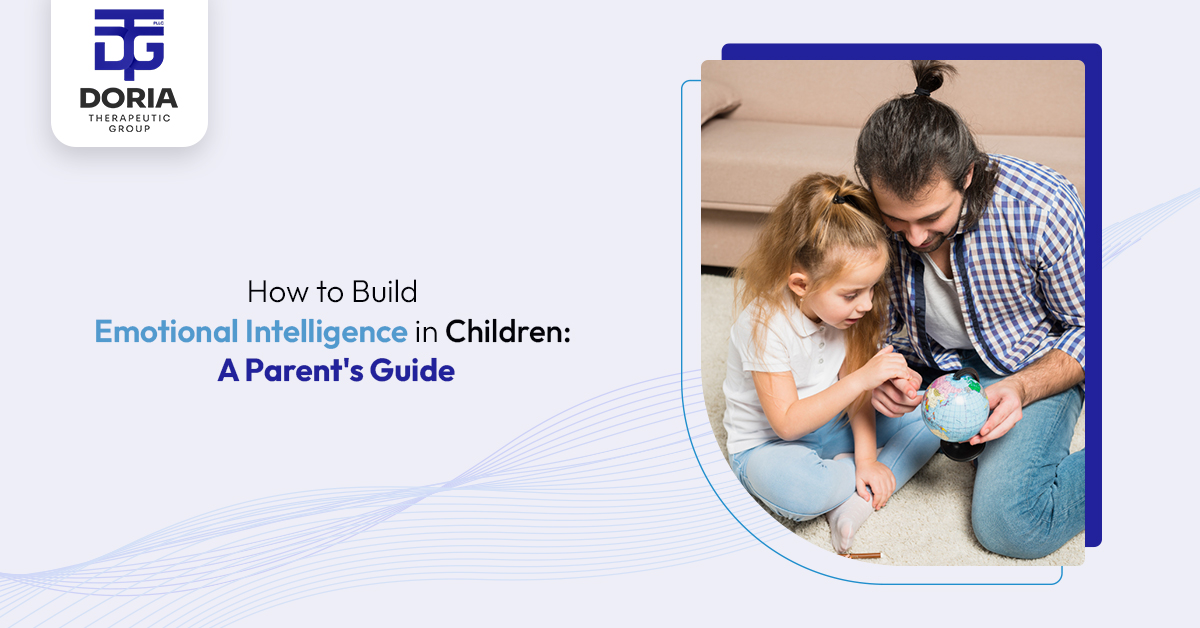Your child melts down over small things. They struggle to make friends. Big emotions overwhelm them daily.
Emotional intelligence in children is your child’s ability to:
- Understand their own feelings
- Manage tough moments
- Connect with others
Kids with these skills do better in school, have stronger friendships, and feel more confident.
You can help them build these skills at home.
The team at Doria Therapeutic Group PLLC works with families who want to help their children navigate emotions better.
Whether it’s through parent coaching or family therapy, we are sure that small changes translate to big differences.
Let’s look at easy ways to improve your child’s emotional skills.
What Is Emotional Intelligence in Children?
Emotional intelligence in children is simple. It’s helping your kid:
- Recognize their feelings
- Understand why they feel that way
- Handle big emotions without melting down
- Notice how others are feeling
- Respond with kindness
Kids with strong emotional skills make friends more easily. They do better in school. They feel more confident. They bounce back from tough times faster.
Start by Looking at Yourself
Your child watches everything you do. How you handle stress. The way you treat the cashier when they’re slow.
Before working on emotional intelligence in children, look at yourself:
- Do you talk about your feelings?
- How do you handle frustration?
- Do you show emotions or hide them?
- Do you treat yourself kindly when you make a mistake?
Your responses create an example of behavior that your child can adhere to.
You do not have to be perfect. It is good to allow them to observe how you tackle emotions in healthy ways.
Accept All Feelings
All feelings are valid. The behavior that comes from those feelings? That’s what we guide.
Your child can feel angry. They can feel sad. Though that does not mean they have a right to be mean to everyone around them.
Teach Words for Feelings
Happy, sad, mad is the starting point for most kids. Emotions, however, are so much more complex.
Help them learn words like:
- Frustrated (when something won’t work)
- Disappointed (when plans change)
- Excited (when good things happen)
- Nervous (before trying something new)
- Proud (after working hard)
- Overwhelmed (when too much is happening)
You can put these words to use.
Guide Them Through Big Emotions
When a child is upset, their brain switches to survival mode. They are incapable of thinking and learning. First, help them feel safe.
Building emotional intelligence in children means being calm:
- Get on their level – sit or kneel down
- Use a soft, steady voice
- Say “You’re safe” or “I’m here”
- Breathe slowly so they can copy you
- Offer a hug if they want one
Save the talking for later. Once they’re calm, then you can problem-solve together.
Show Them How to Notice Others’ Feelings
Empathy grows with practice. Point out feelings you see around you:
- “Look how happy that dog makes its owner”
- “The librarian seems tired today”
- “Your friend looked sad when you said that”
- “Grandpa’s face lit up when you called”
Read books together. Talk about how characters feel. Watch movies and pause to discuss emotions. Even sibling fights become chances to practice seeing someone else’s side.
Simple Daily Habits
Work it into what you already do:
- Ask “How was your heart today?” instead of “How was your day?”
- Share one feeling you had during the dinner conversation
- Notice emotions in songs, TV shows, and books
- Practice deep breathing together before bed
- Celebrate when they use feeling words
- Model apologizing when you make mistakes
Know When Your Child Needs More Support
Some children struggle more with emotions. They might:
- Have meltdowns that seem too big for the situation
- Have trouble making friends
- Worry about everything
- Get overwhelmed easily
- Have trouble sleeping or eating
Some kids just need extra support.
How Professional Support Can Help
There are times when parents can use a little support. The professionals who are experienced in working with kids and families enable one to get personalized strategies.
Under the guidance of a professional, you can perhaps get to learn techniques that are specific to what your child and your family require.
At Doria Therapeutic Group PLLC, we can help.
Our parent support and coaching services, along with family therapy, meet you where you are. When parents feel confident, kids thrive.
Start Small Today and Stay Consistent
Start small:
- Name one feeling each day
- Take three deep breaths when upset
- Ask “How do you think they felt?”
- Say “That must have been hard”
- Hug more, lecture less
Growth Can Take Time
Some days will be great. Your child will use their words and show empathy. Other days will be rough.
Both are normal. Emotional intelligence in children develops slowly. Celebrate little wins along the way.
Every time you comfort your upset child, you’re building emotional intelligence in children.
And every time you validate their feelings, you’re teaching them that their emotions are important.
Be patient. Progress isn’t always visible but it’s happening.
Get Therapeutic Support
Doria Therapeutic Group PLLC provides the personalized guidance you need to feel confident in building emotional intelligence in children.
We provide both individual parent coaching and family therapy sessions so your family can become more emotionally connected.
The entire family is positively affected when parents feel supported.
Reach out to us today to find out how we can assist your family in developing long-lasting emotional bonds.
FAQs
How to build emotional intelligence in children?
- Name feelings when you see them
- Stay calm when they’re upset
- Talk about feelings in books and movies
- Show them how you handle your emotions
What are the 5 C’s of emotional intelligence?
- Being curious about feelings
- Showing kindness to yourself and others
- Being brave with hard emotions
- Staying calm in tough times
- Connecting through understanding
How can we teach children to control their emotions?
- Help them notice feelings first
- Try deep breathing together
- Let them feel safe expressing emotions
- Talk through problems when they’re calm
How do children emotionally develop?
- By watching what you do
- When their feelings are accepted
- Through everyday experiences
- With your support and patience
The child development milestones can provide you with information about what to expect at each age.




